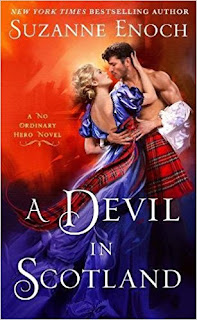A Devil in Scotland—Suzanne Enoch
In a prologue set in 1806, we first encounter the hero and heroine of our story. Eighteen-year-old Rebecca has just announced to her childhood friend, twenty-year-old Callum, that she's marrying his older brother Ian. When he offhandedly tells her she should be marrying him instead, she reminds him that he's a drinking, womanizing playboy and that Ian is stable and secure. When Ian finds out that Callum has proposed to his fiancee, he banishes Callum from darkening his doorstep. Ten years later, Callum has turned his life around, founding his own distillery in Kentucky. Though his brother has tried to reach him several times over the year, Callum has no interest. Until a newspaper arrives announcing that his brother Ian has died. Unconvinced of Ian's cause of death, Callum travels back to Scotland to get to the bottom of what he imagines to be a business-related conspiracy that got Ian murdered, and must figure out whether his old friend Rebecca was part of that conspiracy. Things don't go exactly as planned, though, as Callum's anger doesn't carry him quite as far as he thought.
This book is part of a series. The completionist in me would usually mean that I would have to read the two books preceding this one in the series, but I took a chance and it actually works quite well as a stand alone. It's one of those series that focuses on different romantic pairs in each one. The lovers from the first two books in this series do make a cameo appearance towards the end, and are mentioned a few times, but at no point do you feel as though you have missed a part of the story.
The actual plotline and intrigue, along with the political machinations and entanglements as Callum confronts the leader of his clan and accuses him of murder, were the most interesting part of this book. The twists and turns and reveals had a pretty perfect level of discoverability and suspense. Callum was a bit unpredictable, which led to some of those twists as well.
The writing was incredibly repetitive. After about the tenth time where Callum internally laments how his plans have had to change because everything is different now that he knows that he has a niece...I just don't appreciate having things hammered into my head. Once or even twice would do just fine. Callum mentions that Rebecca "has spleen" at least three separate times. As they get closer to discovering the truth behind Ian's death, Callum mentions several times that he would die for Rebecca, and on at least two occasions, she remarks that she would rather he live for her. I actually had to go back and find the previous mention of this because I thought I'd somehow read the same chapter twice, the wording was so incredibly similar. The book could have been a good 50 pages shorter with more concise, descriptive writing.
Callum seemed to have grown as a character between the prologue and the majority of the action, and I liked the added feature that he had heterochromia, which I'm personally fascinated by and find super adorable. His Scottish brogue got to be a bit affected at certain points. Granted, it's true that I'm not very aware of the style of speech in the early 1800s, but at one point he says five different negative words in the span of three sentences, and every single time it's "nae." It's just a lot.
Rebecca was such a mercurial, frenetic character. There were a number of traits to admire about her, as a portrayal of a woman in the early 1800s, but they were almost lost in the unpredictable nature. She would be yelling at Callum for something in one minute, and then admiring him the next, or vice versa, with no warning for the shift and seemingly no reason to have made such a drastic about-face.
Not to mention Margaret, Rebecca's six-year-old daughter. Precocious would be putting it mildly. Some of the things that she said were just completely unrealistic for a six-year-old, even a very precocious one. It almost seemed at points as though the author had forgotten that she needed to be writing speech patterns that were at all feasible for a small child. Especially since, at one point, Rebecca is thinking about the last time Margaret asked her father to read to her. Her father died 14 months earlier, and Rebecca thinks about how that last time was near to Ian's death, but remarks on how Margaret "toddled into his office." I'm sorry, she's meant to be an incredibly loquacious six-year-old, but she toddled into his office when she was five? I don't know a lot of five year olds who toddle...
The sexy times were fine, but brief. I did appreciate that there wasn't the oft-used virgin trope, as Rebecca is a widow with a child, though there were plenty of other tropes to go around; it ends with one of everyone's favourites—a pregnant heroine. (It was pretty easy to predict, since every romantic encounter ended with a super subtle "he spilled his seed inside her." *Insert extreme eye roll.*)
It was fluffy and pretty quick, so I might pick up any in this series, or by this author, if I was looking for a popcorn read on a weekend. But it's definitely not going to fill you up. Not the worst romance I've ever read, but definitely not the best either. Very middle of the road.
I received an ARC of this book via NetGalley in exchange for an honest review.



Comments
Post a Comment